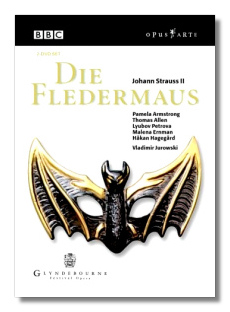
The Internet's Premier Classical Music Source
Related Links
- J. Strauss, Jr. Reviews
- Latest Reviews
- More Reviews
-
By Composer
-
Collections
DVD & Blu-ray
Books
Concert Reviews
Articles/Interviews
Software
Audio
Search Amazon
Recommended Links
Site News
 DVD Review
DVD Review
Johann Strauss II

Die Fledermaus
- Pamela Armstrong (Rosalinde)
- Thomas Allen (Eisenstein)
- Lyubov Petrova (Adele)
- Pär Lindskog (Alfred)
- Håkan Hagegård (Dr. Falke)
- Malena Ernman (Prince Orlofsky)
- Ragnar Ulfung (Dr. Blind)
- Artur Korn (Frank)
Glyndebourne Festival Chorus
London Philharmonic Orchestra/Vladimir Jurowski
BBC Opus Arte OA0890D 2DVDs 196min Anamorphic Widescreen DTS LPCM Stereo Subtitles: English, French, German, Spanish
Recorded live at the Glyndebourne Festival on August 17, 2003, here's a Fledermaus that is something like an apple strudel with too much filling. While retaining the original plot, Director Stephen Lawless has tossed out the spoken dialogues, written new ones of his own (with Daniel Dooner), and had them translated back into German! Apparently it was Lawless' intention to make Fledermaus into more of a play with musical numbers than a Viennese operetta, in which dialogue merely leads you into the next excuse for singing. Lawless therefore had an opportunity to patch some of the holes in Haffner's and Genée's libretto. Nothing doing! Lawless' main achievements seem to have been the addition of a few naughty jokes, and the creation of a much longer evening (or afternoon) in the opera house. The first two acts are given without pause; I wonder how the Glyndebourne audience dealt with two-plus hours without an intermission. It was a bit of a challenge for me at home on my couch!
With all this talking, talking, and talking (handled very well by the international cast, I might add), some of the champagne fizz goes flat. But then Jurowski gives the downbeat and all is well. Blessedly, the musicianship in this production is better than the self-important direction, and everyone in the cast acquits himself or herself well, even if certain cast members seem poorly suited to their roles. Like many Eisensteins, Thomas Allen is too old – if I were Rosalinde, I'd run off with Alfred, even with his bottled-blond hair! Veteran Ragnar Ulfung makes little impression as Dr. Blind. (He is not allowed to stutter in this production.) Malena Ernman is a stunning Orlofsky (at the end, Lawless reveals that the prince was really a princess after all), and Håkan Hagegård and Pamela Armstrong are very satisfying as Dr. Falke and Rosalinde, respectively. Lyubov Petrova is a charmer, both visually and musically, but I feel that Lawless made another error by asking to sing her "Laughing Song" with a look of intense embarrassment on her face.
Lawless updates the action by about thirty years – primarily, it seems, to allow Eisenstein the luxury of a dressing gown designed by Klimt! In the bonus features, there is some talk of Falke being a Freudian, with all the ramifications that entails, but fortunately not much of that comes out in the actual production. Really, Lawless seems to be taking Die Fledermaus a bit too seriously. Not even a proper waltz is allowed in Act Two. Instead, during "Brüderlein and Schwesterlein," the guests are blindfolded and fumble around for each other in what seems to be an anticipation of 1970s-era wife swapping. (Inexplicably, some of the male guests end up in boustiers.)
The set is spectacular, particularly in Act Two, where the use of a rotating stage creates a movie-like effect. Lawless wanted the Eisensteins' residence to be almost as much of a jail as the actual jail in Act Three. Fortunately (again), he didn't really succeed (at least as I see it on DVD).
Jurowski conducts feelingly from a new critical edition of the score, and there are a few surprises, such as some extra material in the trio that closes Act One. (Falke's Act Two song, skipped by almost everyone, but sung so nicely by Dietrich Fischer-Dieskau on the Boskovsky recording, is also omitted here.)
The DVD looks and sounds well; stereo and DTS Digital Surround are the audio formats. As bonuses, we are offered short interviews with Lawless, Armstrong, Allen, Hagegård, and Jurowski, a dance demonstration, a short feature on the architecture of the new Glyndebourne building, and an on-stage lecture on champagne, courtesy of Frosch! Why this was not put in its proper place in the production is another valid question. (Lawless dispenses with all of Frosch's business at the start of Act Three.)
Finally, too many opera DVDs try to distract us during overtures with too much visual nonsense. One can peruse one's program in the theater, if one wishes, or one can choose to watch the conductor and the orchestra – what one can see of them, anyway. Why aren't we given this choice with DVDs?
Copyright © 2004, Raymond Tuttle


















